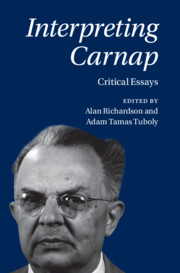Book contents
- Interpreting Carnap
- Interpreting Carnap
- Copyright page
- Contents
- Contributors
- Acknowledgments
- Abbreviations
- Introduction
- Part I Philosophy in New Dress
- Chapter 1 Carnap’s Noncognitivism
- Chapter 2 Carnap Is Not against Metaphysics
- Chapter 3 Interpreting Carnap’s Construction of the World
- Chapter 4 Philosophy in a Collective Spirit as “Politics in Its Broadest Sense”
- Part II Naturalism and Method
- Part III The Logical and the Linguistic
- Part IV Science and Theories
- Bibliography
- Index
Chapter 3 - Interpreting Carnap’s Construction of the World
from Part I - Philosophy in New Dress
Published online by Cambridge University Press: 01 February 2024
- Interpreting Carnap
- Interpreting Carnap
- Copyright page
- Contents
- Contributors
- Acknowledgments
- Abbreviations
- Introduction
- Part I Philosophy in New Dress
- Chapter 1 Carnap’s Noncognitivism
- Chapter 2 Carnap Is Not against Metaphysics
- Chapter 3 Interpreting Carnap’s Construction of the World
- Chapter 4 Philosophy in a Collective Spirit as “Politics in Its Broadest Sense”
- Part II Naturalism and Method
- Part III The Logical and the Linguistic
- Part IV Science and Theories
- Bibliography
- Index
Summary
This chapter provides a critical survey of six of the most important interpretations of Carnap’s Logical Structure of the World or Aufbau. I argue that the variety of interpretations of the Aufbau reflect a reasonable pluralism of approaches. This pluralism can be traced to two factors. First, an interpretation of a philosophical text is sensitive to both normative and descriptive elements. Second, there is a reasonable pluralism with respect to the normative elements of an interpretation, especially the philosophical aim that an interpreter attributes to the author of the text. This analysis builds on recent discussions by Beaney of how the history of analytic philosophy should be done. The upshot of the chapter is that a more reflective approach to writing the history of philosophy should help us to acknowledge the plausibility of interpretations of a text that we refuse to endorse.
- Type
- Chapter
- Information
- Interpreting CarnapCritical Essays, pp. 50 - 69Publisher: Cambridge University PressPrint publication year: 2024

